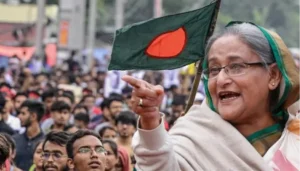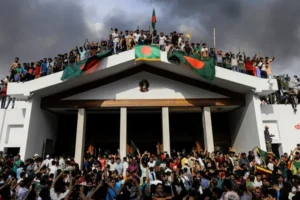Bangladesh After Sheikh Hasina’s Ouster: A Year of Broken Promises and Rising Discontent

Bangladesh after Sheikh Hasina’s ouster has taken a direction few could have predicted. When Nobel laureate Professor Muhammad Yunus assumed leadership as the Chief Adviser of the interim government in August 2024, there was widespread optimism. Citizens hoped for a transparent, democratic renewal after years of political fatigue. Yet one year later, the ground reality is different — marked by economic strain, governance gaps, civil unrest, and shattered promises.
Uprising or Engineered Change? The Reality Unfolds
The story of Bangladesh after Sheikh Hasina’s ouster began with what appeared to be a student-led revolution against the government’s job quota system. But as time passed, public discourse and international reports suggest that the movement was anything but spontaneous.
Multiple credible sources — including Reuters, Al Jazeera, and The Guardian — have reported that the Jamaat-e-Islami, an Islamist party historically opposed to Bangladesh’s independence, was instrumental in executing a meticulously planned regime change. Allegedly backed by foreign influences like Pakistan, China, and the United States, the plan culminated in Hasina’s ouster and the rise of Yunus.
Today, this narrative is widely accepted, replacing the myth of a spontaneous democratic awakening.
The Interim Government: Reforms Promised, But Not Delivered
In Bangladesh after Sheikh Hasina’s ouster, Yunus promised sweeping reforms — from trials against state violence to anti-corruption drives and a fresh electoral process by early 2026. Eleven reform commissions were established to overhaul governance, electoral laws, and the judiciary.
But a year later, most reforms remain stuck. The proposed National Constitutional Council, aimed at bringing institutional clarity, still lacks parliamentary backing. Citizens now view the interim setup as slow, bureaucratic, and disconnected from ground realities.
Economy Under Pressure, Hope on the Decline
One of the biggest letdowns in Bangladesh after Sheikh Hasina’s ouster is the economic downturn. Inflation has surged to 11–14%, and GDP growth has plummeted from 5.7% to just 4%, according to the World Bank.
The banking sector, once the pride of the Bangladeshi economy, is now riddled with bad loans, fraud, and leadership failures. Public confidence is eroding rapidly, with street protests erupting over public sector wage cuts, job uncertainty, and currency devaluation.
Even Yunus’s well-intentioned economic policies haven’t been able to contain the backlash, making it clear that the nation’s financial systems need more than symbolism — they need action.
Cracks in Democracy: Press Freedom and Civil Rights at Risk
A painful irony in Bangladesh after Sheikh Hasina’s ouster is the suppression of press freedom under a regime that promised transparency. Over 640 journalists have faced harassment, threats, or arrests in the last year.
Investigative journalism has been stifled. Government agencies have revoked media credentials, restricted independent reporting, and shut down dissenting outlets. The overall environment has become dangerous for whistleblowers, with mob violence and attacks on religious minorities on the rise — largely unchecked by law enforcement.
Public Disillusionment: From Hope to Despair

People once cheering for change now whisper about the “better old days.” In Bangladesh after Sheikh Hasina’s ouster, public sentiment has shifted drastically. With reforms delayed and institutions weakened, citizens feel betrayed.
Former Prime Minister Sheikh Hasina, in a public letter from exile, described Yunus’s government as a “dark moment in Bangladesh’s history,” claiming she never officially resigned. Her message resonated with many who now feel the cost of regime change has been too high.
Meanwhile, political opposition is gaining momentum. Thousands joined anniversary rallies in Dhaka demanding a clear roadmap for elections. The BNP and other groups are pressing for elections by December 2025, while accusing Yunus of avoiding timelines.
A Ray of Light: Culture and Identity Preservation
Despite the unrest, Bangladesh after Sheikh Hasina’s ouster has witnessed a revival in arts and culture. With support from architect Marina Tabassum, new initiatives are focusing on preserving Bangladesh’s contemporary artistic legacy.
These cultural movements are helping reclaim national identity and provide hope, particularly among youth, artists, and educators.
One Year On: The Crossroads of Crisis and Change
The state of Bangladesh after Sheikh Hasina’s ouster can be summarized in a few truths:
- Reforms have largely stalled, despite big promises.
- The economy is hurting, with inflation and growth both moving in the wrong direction.
- Civil liberties have been weakened, especially press freedom and minority rights.
- Public sentiment is shifting, with more people yearning for pre-ouster stability.
- Elections are uncertain, but demand for them is growing louder every day.
Final Thoughts
As Bangladesh navigates the aftermath of Sheikh Hasina’s exit, it finds itself at a fragile juncture. The interim government under Muhammad Yunus has not yet delivered on its promises. Hopes of reform have dimmed, giving way to economic distress, political unrest, and civil dissatisfaction.
For any meaningful progress, Bangladesh after Sheikh Hasina’s ouster needs more than idealism. It needs transparent leadership, tangible action, and a commitment to restoring the trust of its people.












